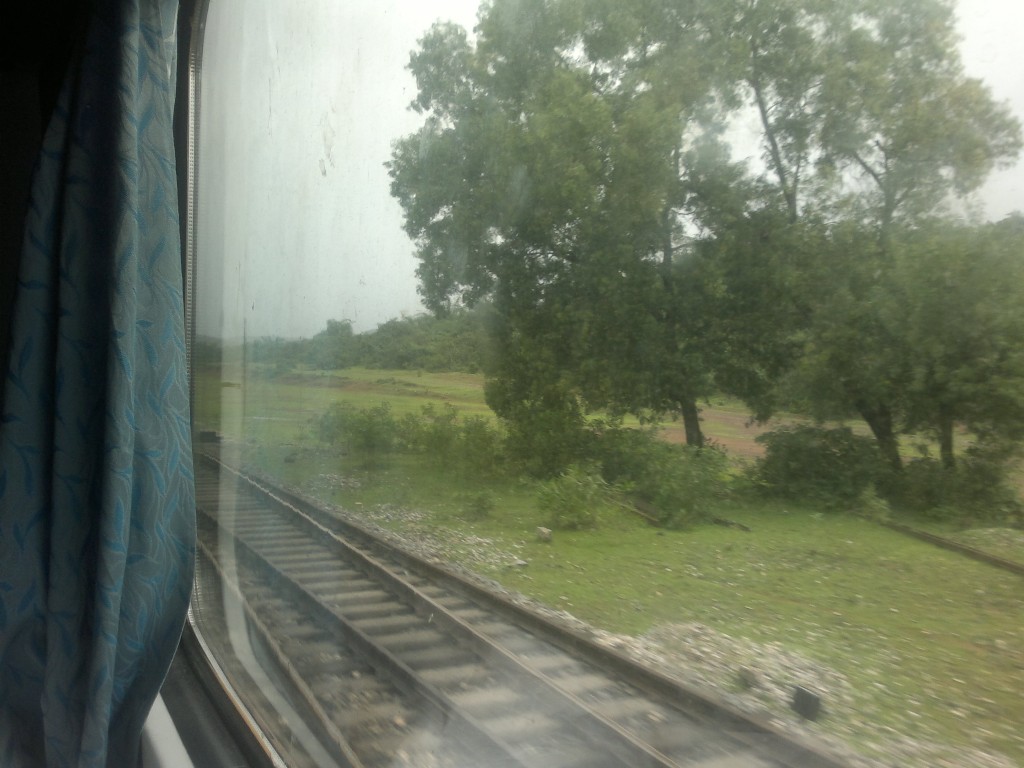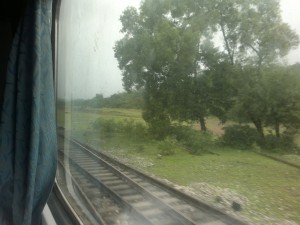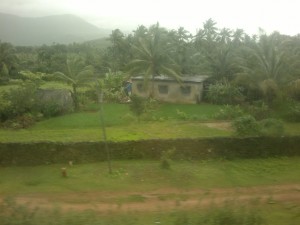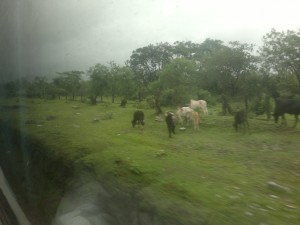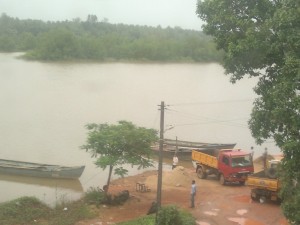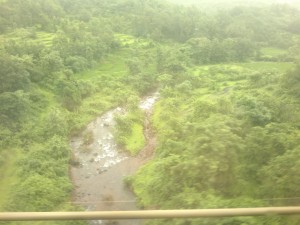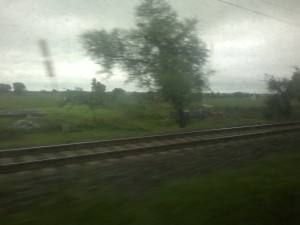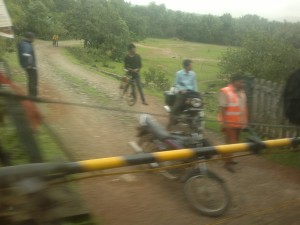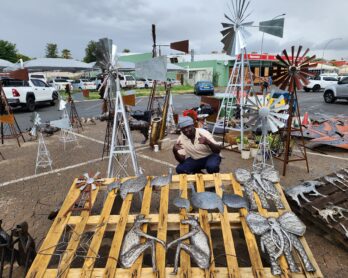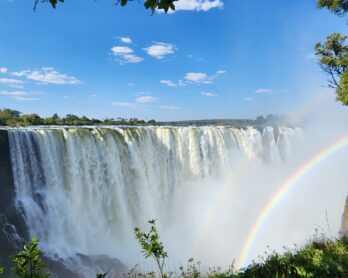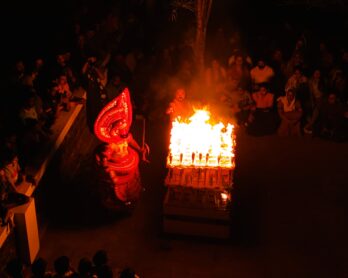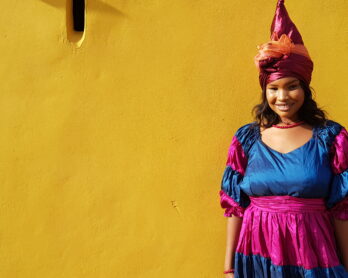‘If not the road, then the rail’ rallied somebody against the cramped and sterilised all-whiteness of air travel. I couldn’t agree more not because it was me.
The Trivandrum – Delhi Rajadhani Express 12431 I took last week passed by Udupi in border Karnataka and was rushing towards Madgaon in Goa. The land glistened from an august overnight rain, treetops bobbed with the gleaming freshness of a kid just out of shower. If rains are supposed to drizzle out by 2040, the clouds here were pregnant with showers, poised to go on forever. Farming fields brimmed over the bunds blurring boundaries for labouring oxen. Mud houses peered misty brown through dark green palm islands set amidst pleasant greenness of vast paddy fields. Their tiled rooftops mossed up from the monsoon blended in almost seamlessly into the broad fronds of the palms fanning all around. If this was agrarian India, then farmer suicides would be hard to fathom. The land looked bountiful, prosperity there for the picking and everybody brisk and happy.
Bunches of uniformed kids splashed merrily through knee-deep slush on their way to school. The sight took me back to the days I seriously mulled stopping studies as my folks went rogue on their promise of getting me a motorcycle if I passed school – which I went on to with distinction even to my own surprise. “You are too stupid and too fast,” they said. I didn’t agree of course as I had broken all my limbs – just once – from accidents. I saluted these kids in genuine admiration: Forget riding a motorcycle, these kids would’ve never even worn a pair of shoes. They didn’t look grumpy or sullen like I did for weeks afterwards but joyous that somewhere beyond all the muck they could sit under a thatched roof and pick up some stuff.
The scheduled 10-minute stop at Madgaon became 20; the usually punctual capital express seemed lost in the verdant quaint of this old-world Goan town by the River Sal. Pulling out with a reluctant shudder, the train gathered speed suddenly as if it just crossed its mind that coming up next was Ratnagiri along the Sahyadri-clad border of Maharashtra. But near the Majorda junction a few minutes away, we were overtaken by the freewheeling Goan spirit: An auburn haired damsel in funky sun shades overtook us on a gleaming yellow Vespa. My eyes burrowed out of the large side berth windows, my heart skipped to ‘Mere Sapnon Ki Rani’ from the movie ‘Aradhana’ the national ditty of every lovelorn Indian. What if she was more (Fearless) Nadia than doe-eyed Sharmila, my heart deserted me right there.
Lonely as we picked up speed again, I turned my attention to mundane things like the world outside. ‘Two accused in mining cases seek bail’ read the morning paper. One included a former additional chief secretary to the government of Karnataka. The case had been dragging on for long with no indictments and the top babu wanted to be cleared of all charges now; his counsel’s quote was a lesson in media doctoring – every crook and his nanny seemed to be adept at it these days. Then, this is just the tip of the iceberg – the prominently visible tip. Sand mining continued rampant and audacious from river beds all along the railway line. Not only was this a proven reason for floods and landslides but along the tracks this can mean loss of more lives and resources – like innocent passers-by like me on trains. The activity, if unhindered, has the potential to render every river crossing a ‘Temple Run’ edge. Bookies note.
‘You haven’t been to a country until you have had to cross the border physically,’ said Jim Rogers. Then, not many of us will have a customised Merc nor the kind of money the ‘adventure capitalist’ had at his disposal. So there is travel writer Paul Theroux who said ‘I have seldom heard a train go by and not wished I was on it.’ Let me give you celebrated journalist Cesar Soriano too: There is something about the railways that you can’t experience in a tin can flying 30,000 feet above the ground’ (Taken from his travelogue ‘Baghdad to Basra.’) Besides the romance of the journey, the longer period you are officially excused from being anywhere and the bigger legroom are a bonus. Further appealing is that the person in front of you will not graze over your chest or glide over your crotch to nap on your lap. Trust me, with the new spate of cost-cutting measures from the (already) low cost airlines, the lure of the railways is slated to chug only north. Of course it was added in the fare, but I felt good not opening my wallet after every snack or meal. When the appetiser of tomato soup and breadstick with a butter chunk came, I was crying with joy. Okay, the servers do not sashay down the aisle nor flutter a mascara-ed lash, rather struggle against the vehement sway and their shirts will be a losing battle for Blue Water. Then, I can wait till Delhi for all that.
Around four in the evening we rolled into Ratnagiri. The famous port station is generous in equal measure doling scenic handouts to dwellers in deeper hinterlands to passers-by along the fringes. Rivulets, streams, lakes and those little waterfalls by the rail line made gushing serious business. Hillsides in different shades of green overlapped each other, gleaming roads wound their way up playing coy with the track and tunnels became unending. The tunnel between Bhoke on Ratnagiri outskirts and Ukshi must have gone on for at least 10 kilometres. Towards the end of the tunnel bathed in dark, even the Rajadhani lost steam, dawdled a bit, seemingly perplexed maybe scared at what it had gotten into. Little houses sneaked under the canopies of khair and kinjal, ain and teak. These must be the sinning nests of the hillside town where lovers of all sorts escape from Mumbai for secret trysts.
The Express hurtled toward dusk. Before I climbed further up to a drier, browner north the next day, the earth seemed in a gasping hurry to open up more of her bucolic green glories to me. The paddy that was planted that morning at Canacona in Goa sprouted at Veer in Maharashtra; their blooming heads seemed to instill in the farmers a renewed vigour returning home on bicycles. The marshlands next to the railway tracks began to wiggle their way into a blanket as the clouds darkened above them. The sheep flocked behind the shepherdess quietly resigned to another night fenced in; the young lambs gambolled about in happy oblivion. As if in answer to an insane prayer the Rajadhani made an unscheduled stop in the midst of this pastoral nowhere.
Halloa! You there!! In Charles Dickens’ short story ‘The Signalman’ published in 1866, the railway cutting (a rock side cut to make a railway station) is a cold and lonely place, it still is. The signalman’s routine is dull and monotonous and it continues to be. But come hailstorm or high water, he is still there – waving the green flag or lamp, a reassuring sight especially so at night. I peered at so many of these men while passing through crossings like, say, Gokarna Road or Karwar. Not one looked like they owned a mobile phone; even if they could afford one, these areas did not show any grid on my mobile. Made me wonder how would they get urgent, important news – like a birth or death, marriage or promotion? If the government of India can continually bail out a fiscal black hole like the Air India, it should’ve saved the telegraph too. See the numbers: thousands of crores of rupees are sunk into for the airlines which employ about 27,000 while the Indian Railways has over 14 lakh direct employees.


